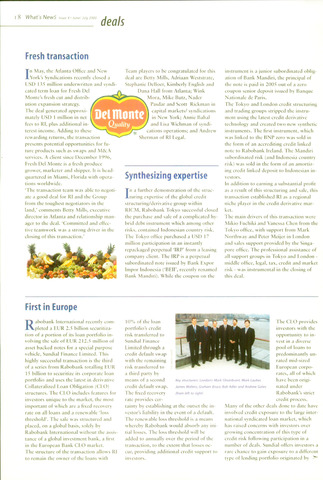deals
Fresh transaction
Synthesizing expertise
First in Europe
What's NewS Issue 4 June/ July 2000
In May, the Atlanta Office and New
York's Syndications recently closed a
USD 135 million underwrittcn and syndi
cated term loan for Fresh Del
Monte's fresh cut and distrib-
ution expansion strategy.
The deal generated approxi-
mately USD 1 million in net
fees to RI, plus additional in
terest income. Adding to these
rewarding returns, the transaction
presents potential opportunities for fu
ture products such as swaps and M&A
services. A cliënt since December 1996,
Fresh Del Monte is a fresh produce
growcr, marketer and shipper. It is head-
quartered in Miami, Florida with opera-
tions worldwide.
'The transaction team was able to negoti
ate a good deal for RI and the Group
from the toughest negotiators in the
land,' comments Betty Mills, executive
director in Atlanta and relationship man
ager to the deal. 'Committed and effec-
tive teamwork was a strong driver in the
closing of this transaction.'
Team players to be congratulated for this
deal are Betty Mills, Adriaan Weststrate,
Stephanie DeBoer, Kimberly English and
Dana Hall from Atlanta; Wink
Mora, Mike Butz, Nader
Pasdar and Scott Rickman in
capital markets/ syndications
in New York; Annie Bahal
and Lisa Wichntan of syndi
cations operations; and Andrew
Sherman of RI Legal.
In a furthcr demonstration of the struc-
turing expertise of the global credit
structuring/derivative group within
RICM, Rabobank Tokyo successful closed
the purchase and sale of a complicated hy-
brid debt instrument which among other
risks, contained Indonesian country risk.
The Tokyo office purchased a USD 17
million participation in an instantly
repackaged perpetual 'IRP' from a leasing
company cliënt. The IRP is a perpetual
subordinated note issued by Bank Expor
Impor Indonesia ('BEU', recently renamed
Bank Mandiri). While the coupon on the
instrument is a junior subordinated oblig-
ation of Bank Mandiri, the principal of
the note is paid in 2005 out of a zero
coupon senior dcposit issued by Banque
Nationale de Paris.
The Tokyo and London credit structuring
and trading groups strippcd the instru
ment using the latest credit derivative
technology and created two new synthetic
instruments. The first instrument, which
was linked to the BNP zero was sold in
the form of an accrediting credit linked
note to Rabobank Ircland. The Mandiri
subordinated risk (and Indonesia country
risk) was sold in the form of an amortiz-
ing credit linked deposit to Indonesian in-
vestors.
In addition to earning a substantial profit
as a result of this structuring and sale, this
transaction establishcd RI as a regional
niche player in the credit derivative rnar-
ket.
The main drivers of this transaction were
Mikio Fuchiki and Vanessa Chen from the
Tokyo office, with support from Mark
Northway and Peter Meijer in London
and sales support provided by the Singa
pore office. The professional assistancc of
all support groups in Tokyo and London -
rniddle office, legal, tax, credit and market
risk - was instrumental in the closing of
this deal.
Rabobank International recently com-
pleted a EUR 2.5 billion securitiza-
tion of a portion of its loan portfolio in-
volving the sale of EUR 212.5 million of
asset backed notes for a special purpose
vehicle, Sundial Finance Limited. This
highly successful transaction is the third
of a series from Rabobank totalling EUR
15 billion to securitize its corporate loan
portfolio and uses the latest in derivative
Collateralized Loan Obligation (CLO)
structures. The CLO includes features for
investors unique to the market, the most
important of which are a fixed recovery
rate on all loans and a renewable 'loss
threshold'. The sale was structured and
placed, on a global basis, solely by
Rabobank International without the assis-
tance of a global investment bank, a first
in the European Bank CLO market.
The structure of the transaction allows RI
to remain the owner of the loans with
10% of the loan
portfolio's credit
risk transferred to
Sundial Finance
Limited through a
credit default swap
with the remaining
risk transferred to
a third party by
rneans of a second
credit default swap.
The fixed recovery
rate provides cer-
tainty by establishing at the outset the in-
vestor's Iiability in the event of a default.
The renewable loss threshold is a means
whereby Rabobank would absorb any ini-
tial losses. The loss threshold will be
added to annually over the period of the
transaction, to the extent that losses oc-
cur, providing additional credit support to
investors.
The CLO provides
investors with the
opportunity to in-
vest in a diverse
pool of loans to
predoniinantly un-
rated mid-sized
European corpo-
rates, all of which
have been origi-
nated under
Rabobank's strict
credit process.
Many of the other deals done to date have
involved credit exposure to the large inter
national syndicated loan market, which
has raised concerns with investors over
growing concentration of this type of
credit risk following participation in a
number of deals. Sundial offers investors a
rare chance to gain exposure to a different
type of lending portfolio originated by
Key structurers: iondon s Mark Gheerbrant, Mark Lauber,
James Walters, Graham Bruce, Bob Adler and Andrew Gates
(from left to right)

